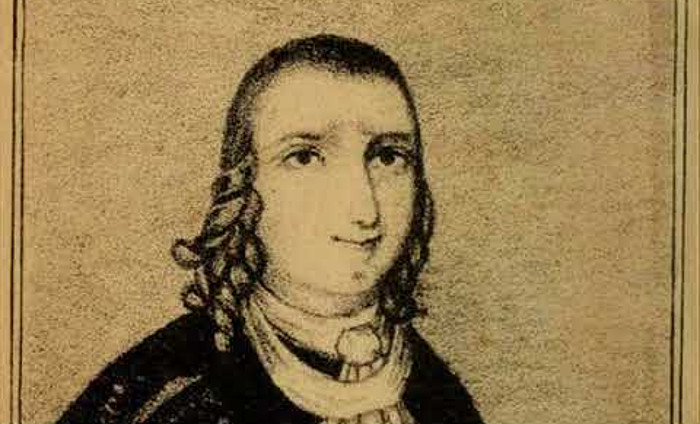
After a severe fever in 1776, Rhode Island farmer’s daughter Jemima Wilkinson was reborn as a genderless celestial being who had been sent to warn of the coming Apocalypse. But the general public was too scandalized by the messenger to pay heed to the message. In this week’s episode of the Futility Closet podcast we’ll tell the story of the Public Universal Friend and the prejudiced reaction of a newly formed nation.
We’ll also bid on an immortal piano and puzzle over some Icelandic conceptions.
Intro:
When identical images of a tower are placed side by side, the towers appear to diverge.
In 2002, Erl E. Kepner patented a one-sided coffee mug.
Sources for our feature on the Public Universal Friend:
Paul B. Moyer, The Public Universal Friend: Jemima Wilkinson and Religious Enthusiasm in Revolutionary America, 2015.
Herbert Andrew Wisbey, Pioneer Prophetess: Jemima Wilkinson, the Publick Universal Friend, 1964.
Catherine A. Brekus, Strangers and Pilgrims: Female Preaching in America, 1740-1845, 2000.
Michael Bronski, A Queer History of the United States, 2011.
Joel Whitney Tibbetts, Women Who Were Called: A Study of the Contributions to American Christianity of Ann Lee, Jemima Wilkinson, Mary Baker Eddy and Aimee Semple McPherson, 1978.
Stafford Canning Cleveland, History and Directory of Yates County, 1873.
Lewis Cass Aldrich, History of Yates County, N.Y., 1892.
Wilkins Updike, James MacSparran, and Daniel Goodwin, A History of the Episcopal Church in Narragansett, Rhode Island, Volume 1, 1907.
Sharon Betcher, “‘The Second Descent of the Spirit of Life from God’: The Assumption of Jemima Wilkinson,” in Brenda E. Brasher and Lee Quinby, eds., Gender and Apocalyptic Desire, 2014.
Paul Buckley, “The Public Universal Friend: Jemima Wilkinson and Religious Enthusiasm in Revolutionary America,” Friends Journal 62:6 (June-July 2016), 38.
Scott Larson, “‘Indescribable Being’: Theological Performances of Genderlessness in the Society of the Publick Universal Friend, 1776-1819,” Early American Studies 12:3 (Fall 2014), 576-600.
Shelby M. Balik, “The Public Universal Friend: Jemima Wilkinson and Religious Enthusiasm in Revolutionary America,” Journal of the Early Republic 38:1, 157-160.
Gwen Gosney Erickson, “The Public Universal Friend: Jemima Wilkinson and Religious Enthusiasm in Revolutionary America,” Quaker History 106:1 (Spring 2017), 28-29.
Beverly C. Tomek, “The Public Universal Friend: Jemima Wilkinson and Religious Enthusiasm in Revolutionary America,” Journal of American History 103:3 (December 2016), 746–747.
Charles Lowell Marlin, “Jemima Wilkinson: Errant Quaker Divine,” Quaker History 52:2 (Autumn 1963), 90-94.
Jeremy Rapport, “The Public Universal Friend: Jemima Wilkinson and Religious Enthusiasm in Revolutionary America,” Early American Literature 52:1 (2017), 249-253, 267.
Janet Moore Lindman, “From Salvation to Damnation: Popular Religion in Early America,” Reviews in American History 45:4 (December 2017), 570-575.
Margaret Bendroth, “Angry Women and the History of American Evangelicalism,” Fides et Historia 34:2 (Summer 2002), 113.
Samantha Schmidt, “A Genderless Prophet Drew Hundreds of Followers Long Before the Age of Nonbinary Pronouns,” Washington Post, Jan. 5, 2020.
Molly Worthen, “A Tour Through the ‘American Messiahs’ of Our Past,” New York Times, April 26, 2019.
Greg Barnhisel, “The Book of Nonconformists: America Has Always Been a Home to Self-Styled Messiahs,” Pittsburgh Post-Gazette, April 7, 2019, E5.
Chris Jennings, “The Prophets Among Us,” Wall Street Journal, April 4, 2019, A15.
Gary Craig, “‘Friend’ Fund Named in Suit Found Offshore,” Rochester [N.Y.] Democrat and Chronicle, Jan. 7, 2007, A7.
“Life Story: The Public Universal Friend (1752–1819),” Women & The American Story, New York Historical Society (accessed Feb. 25, 2020).
Listener mail:
Sonia Purnell, A Woman of No Importance, 2019.
“Britain’s Secret WWII Weapons Revealed,” BBC News, Oct. 26, 1999.
Patrick Sawer and Hannah Furness, “From Garlic Chocolate to Exploding Animal Droppings: How Britain’s Weird WWII Inventions Helped Fool the Nazis,” Telegraph, June 1, 2017.
Neil Johnston, “Weird Weapons That Nobbled Nazis Revealed in New Book,” Times, June 2, 2017.
Wikipedia, “Charles Fraser-Smith” (accessed Feb. 29, 2020).
Wikipedia, “Q-Ship” (accessed Feb. 29, 2020).
James Barron, “Charles Fraser-Smith, Mr. Gadget For James Bond Tales, Dies at 88,” New York Times, Nov. 13, 1992.
Barry Fox, “Review: Careful Carruthers, That Paper Clip Is Loaded,” New Scientist, Aug. 14, 1993.
Owen Mortimer, “‘Immortal Piano’ Offered for Sale Online,” Rhinegold Publishing, Jan. 20, 2020.
eBay, “Siena Pianoforte Immortal Piano Marchisio 1800’s Sculpted By Bartalozzi & Ferri,” listing ended Feb. 5, 2020.
“Seized by Nazis, Found in Israel, ‘Immortal Piano’ Expected to Fetch $1m,” Times of Israel, March 1, 2020.
“‘Immortal Piano’ Set for Israel Auction,” ArtDaily, March 6, 2020.
This week’s lateral thinking puzzle was contributed by listener Chris Pallant. Here’s a corroborating link (warning — this spoils the puzzle).
You can listen using the player above, download this episode directly, or subscribe on Google Podcasts, on Apple Podcasts, or via the RSS feed at https://futilitycloset.libsyn.com/rss.
Please consider becoming a patron of Futility Closet — you can choose the amount you want to pledge, and we’ve set up some rewards to help thank you for your support. You can also make a one-time donation on the Support Us page of the Futility Closet website.
Many thanks to Doug Ross for the music in this episode.
If you have any questions or comments you can reach us at podcast@futilitycloset.com. Thanks for listening!
